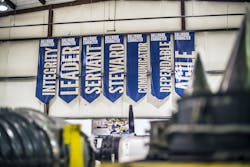Got Character?
The mission of aviation maintenance training schools across the country is to ensure that new AMTs are ready to enter the workforce. Of course, readiness goes beyond simple technical competency – the maintenance industry demands more than just applied skills. The member institutions of the Aviation Technician Education Council (ATEC) work tirelessly to provide students with all of the tools they will need to succeed in the workforce, support aviation business, and keep the world in flight. How seriously do A&P schools take this responsibility? See for yourself, with an example from ATEC member Hallmark University in San Antonio, TX:
When we talk about professionalism in the workplace, this idea congers up some lively discussion and often times involves a story where human resources (HR) was called. Having a graduate degree in HR and with my experience in leading big organizations, the majority of issues in the workplace aren’t always due to low sales, decreasing enrollments, a lack of production, and the like. In fact many hours of a manager’s day are spent dealing with human issues and in most cases, it stems from a lack of professionalism - otherwise known as character.
Character looks different to many people depending on what industry you work in. As a part of our Program Advisory Committee (PAC) at Hallmark University, our industry partners across all of our academic programs pose this exact question: “How do we better instill professionalism or character in our industry?” Hands down, every one of them says it is paramount; and that it is lacking. To be fair, virtually all of our PAC members agree there are pockets of excellence in this area, however in general, there is an overall need to improve character in today’s workforce, especially at the entry levels.
It's the Soft Skills that matter
To that end, when asked, most of the talents employers suggest are lacking from today’s college graduates are not technical or job specific in nature. Instead, employers scream about the lack of collaboration skills, communication skills, ethical judgment and decision making (Selingo, 2015). These are often called “soft skills.” This is not news to Hallmark University. In fact, the PACs have for years made it clear that the assets they valued most in their employees were soft skills. Particularly someone that was ethical and could be trusted, was dependable, could think critically to solve problems, understood and embraced the mission of the organization, and could effectively communicate with colleagues and customers. The consistent value placed on these prized traits became the driving factor behind the establishment of the Hallmark Character Education Program (HCEP).
André Maurois, a French author, once said, “If you create an act, you create a habit. If you create a habit, you create a character. If you create a character, you create a destiny.” As a mission-driven, private, nonprofit educator, we are committed to changing lives through education. We took this feedback from our industry partners and pooled the collective experiences of our staff and faculty to make a change; to make this character void part of our mission in providing an education and to develop it. In fact the first stanza of our mission statement begins with the words, “We change individual lives by developing superior skills, knowledge, and character, hallmarked by excellence and integrity.”
So obviously, the skills we develop are within the specific programs we provide, such as aviation, nursing, IT, business, and medical assisting. The knowledge is the degree the student earns ranging from a Master's to Associate's level. Then the character piece makes the third leg of this stool we build, and this has proven to be the most critical piece of the equation. When discussing entry-level employees or any employee for that matter, I ask someone which of these three legs of the stool (skills, knowledge, or character) is most important; hands down the answer is character. They will go on to tell me that they can have a great technician or the smartest Ph.D. on staff, but if they lack the character and professionalism, they are essentially useless, and often times a liability.
Hallmark Character Education Program (HCEP)
To address this very widespread shortfall, we developed the HCEP. This program develops character from the ground up. Every student and employee of the university is required to complete the HCEP. This program defines and explores the following seven character traits: integrity, dependability, leadership, stewardship, service, communication, and agility. Each trait is individually considered during an eight-week term, so during their time with us, they will have studied over 56 hours on character alone; even more if they choose to achieve the level of distinction for going beyond the minimum requirements. Will this instantly instill the character employers need? Well, it is a great start and we have seen the evidence that it is making a difference.
Feedback on the program from our employers is yet to be realized as our first cohorts are yet to graduate. But through the day-to-day interactions with staff, faculty, and students alike, the individual traits and concepts are being discussed and utilized on a daily basis. This is proof that it is not just a bunch of words on a wall and that a connection is being made. Seeing more accountability in the classroom, dependability in our attendance numbers, and communication between all parties is part of the empirical proof that change is taking place.
Donald “Jay” Gregson has served on the ATEC Board for the past two years as chair of the Membership Relations Committee. He has over 30 years of aircraft maintenance and logistics experience. He retired from the USAF after 23 years and then worked with the Department of the Air Force as a civilian employee in the MRO and private public partnership realm. He is now the senior vice president of University Operations and Hallmark University in San Antonio, TX. Learn more about ATEC at www.atec-amt.org and Hallmark University at hallmarkuniversity.edu.
